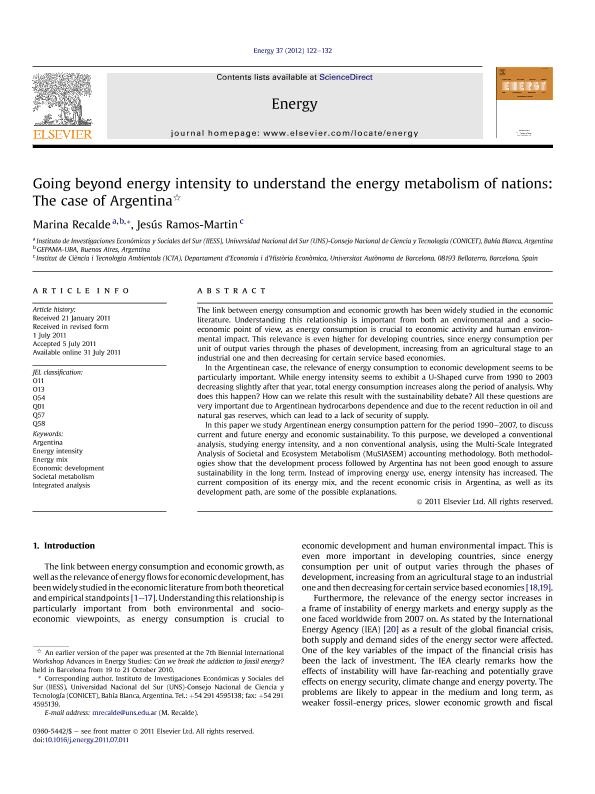Mostrar el registro sencillo del ítem
dc.contributor.author
Recalde, Marina Yesica

dc.contributor.author
Ramos Martin, Jesús
dc.date.available
2019-06-13T17:41:26Z
dc.date.issued
2012-01
dc.identifier.citation
Recalde, Marina Yesica; Ramos Martin, Jesús; Going beyond energy intensity to understand the energy metabolism of nations: The case of Argentina; Pergamon-Elsevier Science Ltd; Energy; 37; 1; 1-2012; 122-132
dc.identifier.issn
0360-5442
dc.identifier.uri
http://hdl.handle.net/11336/78232
dc.description.abstract
The link between energy consumption and economic growth has been widely studied in the economic literature. Understanding this relationship is important from both an environmental and a socio-economic point of view, as energy consumption is crucial to economic activity and human environmental impact. This relevance is even higher for developing countries, since energy consumption per unit of output varies through the phases of development, increasing from an agricultural stage to an industrial one and then decreasing for certain service based economies.In the Argentinean case, the relevance of energy consumption to economic development seems to be particularly important. While energy intensity seems to exhibit a U-Shaped curve from 1990 to 2003 decreasing slightly after that year, total energy consumption increases along the period of analysis. Why does this happen? How can we relate this result with the sustainability debate? All these questions are very important due to Argentinean hydrocarbons dependence and due to the recent reduction in oil and natural gas reserves, which can lead to a lack of security of supply.In this paper we study Argentinean energy consumption pattern for the period 1990-2007, to discuss current and future energy and economic sustainability. To this purpose, we developed a conventional analysis, studying energy intensity, and a non conventional analysis, using the Multi-Scale Integrated Analysis of Societal and Ecosystem Metabolism (MuSIASEM) accounting methodology. Both methodologies show that the development process followed by Argentina has not been good enough to assure sustainability in the long term. Instead of improving energy use, energy intensity has increased. The current composition of its energy mix, and the recent economic crisis in Argentina, as well as its development path, are some of the possible explanations.
dc.format
application/pdf
dc.language.iso
eng
dc.publisher
Pergamon-Elsevier Science Ltd

dc.rights
info:eu-repo/semantics/openAccess
dc.rights.uri
https://creativecommons.org/licenses/by-nc-sa/2.5/ar/
dc.subject
Argentina
dc.subject
Economic Development
dc.subject
Energy Intensity
dc.subject
Energy Mix
dc.subject
Integrated Analysis
dc.subject
Societal Metabolism
dc.subject.classification
Economía, Econometría

dc.subject.classification
Economía y Negocios

dc.subject.classification
CIENCIAS SOCIALES

dc.title
Going beyond energy intensity to understand the energy metabolism of nations: The case of Argentina
dc.type
info:eu-repo/semantics/article
dc.type
info:ar-repo/semantics/artículo
dc.type
info:eu-repo/semantics/publishedVersion
dc.date.updated
2019-06-10T14:19:17Z
dc.journal.volume
37
dc.journal.number
1
dc.journal.pagination
122-132
dc.journal.pais
Estados Unidos

dc.description.fil
Fil: Recalde, Marina Yesica. Consejo Nacional de Investigaciones Científicas y Técnicas. Centro Científico Tecnológico Conicet - Bahía Blanca. Instituto de Investigaciones Económicas y Sociales del Sur. Universidad Nacional del Sur. Departamento de Economía. Instituto de Investigaciones Económicas y Sociales del Sur; Argentina
dc.description.fil
Fil: Ramos Martin, Jesús. Universitat Autònoma de Barcelona; España
dc.journal.title
Energy

dc.relation.alternativeid
info:eu-repo/semantics/altIdentifier/url/https://www.sciencedirect.com/science/article/pii/S0360544211004592
dc.relation.alternativeid
info:eu-repo/semantics/altIdentifier/doi/http://dx.doi.org/10.1016/j.energy.2011.07.011
Archivos asociados
